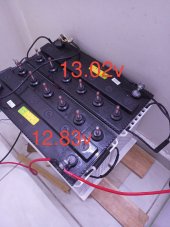So I bought two 200Ah 12v batteries to connect in series, they are manufactured in sept. 2021 so they lost some charge.
I charged each one on a 12v charger until they both rested on 13.8v and then installed them and set the mppt controller to FLD (I suppose it means flooded).
The next day the charge controller was charging on 29v and in the evening I started to smell a strong rotten eggs smell and after a couple of searches I found out it's hydrogen sulfide.
The batteries weren't hot or bubbling and there's no apparent acid water on the surface of the batteries.
I opened the windows and changed the settings to GEL (to give a lower voltage).
Today there isn't any sun (it's snowy and the charge controller giving 0.5 amps lol)
There's no rotten eggs smell, I measured the voltage of the bank and it's 28.2v (charge controller is saying 27.5v)
And I measured each battery, positive pole battery was 13.45v and the negative one was 13.8v.
The multimeter is old and could be unreliable I don't know for sure.
The batteries are connected with 10mm thick 30cm long copper cable.
The temperature was -5/15 yesterday and today it's lower, if that's relevant.
Considering all of the information above, Is it normal for new batteries to give off that smell?
I charged each one on a 12v charger until they both rested on 13.8v and then installed them and set the mppt controller to FLD (I suppose it means flooded).
The next day the charge controller was charging on 29v and in the evening I started to smell a strong rotten eggs smell and after a couple of searches I found out it's hydrogen sulfide.
The batteries weren't hot or bubbling and there's no apparent acid water on the surface of the batteries.
I opened the windows and changed the settings to GEL (to give a lower voltage).
Today there isn't any sun (it's snowy and the charge controller giving 0.5 amps lol)
There's no rotten eggs smell, I measured the voltage of the bank and it's 28.2v (charge controller is saying 27.5v)
And I measured each battery, positive pole battery was 13.45v and the negative one was 13.8v.
The multimeter is old and could be unreliable I don't know for sure.
The batteries are connected with 10mm thick 30cm long copper cable.
The temperature was -5/15 yesterday and today it's lower, if that's relevant.
Considering all of the information above, Is it normal for new batteries to give off that smell?



